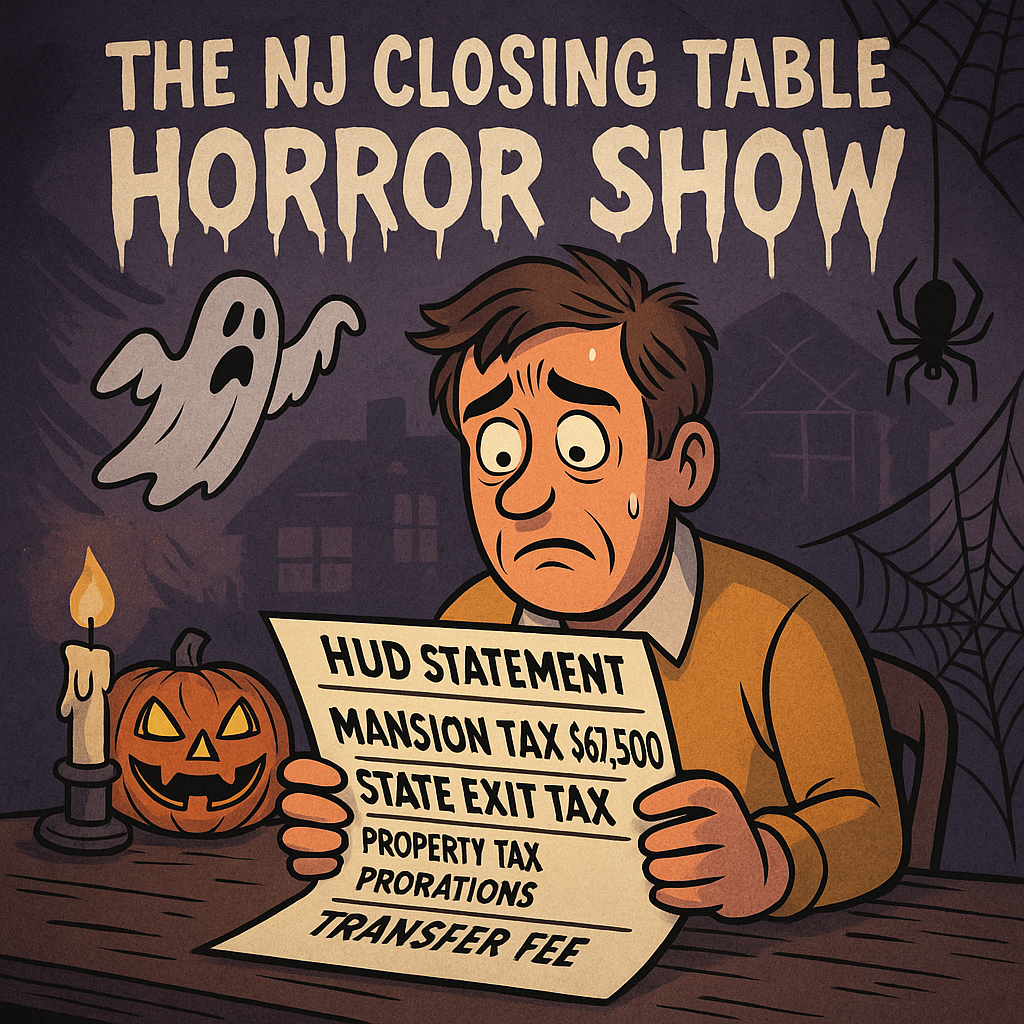
Because apparently the nation’s highest property taxes, bloated insurance premiums, endless highway tolls, sky-high home prices, and crushing rents just weren’t enough. So sure, let’s pile on another tax. As part of Governor Murphy’s final state budget before leaving office, New Jersey has introduced a significantly expanded mansion tax targeting high-end home sales. The reason? A growing state budget deficit that Trenton’s solving the old-fashioned way—by squeezing more out of people who already feel like they’re being taxed to death.
For transactions closing on or after July 10, 2025, the seller is now responsible for the following tiered rates:
- $1M to $2M: 1.0%
- $2M to $2.5M: 2.0%
- $2.5M to $3M: 2.5%
- $3M to $3.5M: 3.0%
- $3.5M and up: 3.5%
If you’re selling a home for $3.6 million, you’re now facing a $126,000 tax bill, paid directly by the seller at closing. That’s in addition to agent commissions, possible capital gains taxes, and moving expenses.
How Sellers Can Offset the Impact
While sellers are now legally responsible for the mansion tax, there’s room for negotiation. A seller can ask the buyer to pay part or all of the tax as part of the deal structure. This strategy might be especially useful in competitive markets or in situations where the buyer is already stretching their budget to secure the property.
In practice, the mansion tax is now a critical part of the net sheet discussion and may affect how homes are priced and marketed.
Will This Hurt the NJ Luxury Market?
There’s strong reason to believe it will. Here’s why:
- Pricing Pressure: Sellers may attempt to raise prices to cover the tax, but buyers may push back, leading to longer days on market.
- Reduced Net Proceeds: High-end sellers could lose hundreds of thousands of dollars in equity, especially when combined with commissions and capital gains taxes.
- Tax Flight: Affluent homeowners already frustrated by high property taxes and cost of living may see this as a final straw and explore out-of-state options.
Do Other States Have a Mansion Tax?
Yes—but New Jersey just leapfrogged most of them in how aggressively it’s applied. Here’s how it compares:
- New York: A mansion tax starts at 1% for $1M+ and climbs to 3.9% for sales over $25M—but it’s paid by the buyer, not the seller.
- Connecticut: Imposes a progressive conveyance tax over $2.5M, but its top rates are still below NJ’s 3.5%.
- California: No statewide mansion tax, but certain localities (like Los Angeles) impose “high-value property transfer” taxes.
- Florida, Texas, North Carolina: No mansion tax at all. These states continue to attract high-net-worth individuals seeking tax relief.
Where Might NJ Luxury Buyers Look Instead?
Here are some tax-friendly alternatives for high-end buyers and sellers who are fed up with New Jersey’s cost structure:
- Florida: No state income tax, no mansion tax, and luxury markets in Naples, Palm Beach, and Boca Raton are booming.
- Texas: Another no-income-tax state with growing luxury hubs like Austin, Dallas, and Houston.
- North Carolina & South Carolina: Coastal towns like Charleston, Hilton Head, and Wilmington offer upscale living with far lower taxes.
- Pennsylvania: While there is a realty transfer tax, the overall costs are lower, and many NJ sellers are willing to trade the commute for relief.
What Should NJ Sellers Do Now?
If you’re listing a home over $1 million in New Jersey:
- Work with an agent who understands the mansion tax law and how to navigate negotiations accordingly.
- Review your updated net sheet to understand your true take-home amount after taxes.
- Consider creative deal structures—such as negotiating a split or buyer contribution toward the mansion tax.
This law adds a new layer of complexity, and sellers who plan ahead will be better positioned to protect their equity.
Bottom Line
New Jersey’s updated mansion tax shifts the financial burden onto sellers and raises costs for those exiting the high-end market. This move may slow down luxury sales, change pricing strategies, and encourage more affluent residents to look elsewhere. Whether you’re staying, selling, or relocating, understanding how this tax affects your bottom line is now essential.
Thinking of Selling a Luxury Property in NJ?
Let’s break down the numbers and explore your options.
📞 Call Kevin Hill at 201-214-1349
📩 Visit NJHousePartners.com

